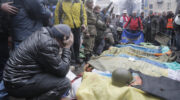Resilience Europe
The call of home: Why some Ukrainian refugees are risking a return now
| View caption Hide caption
Though millions of Ukrainians remain refugees abroad, an increasing number are returning home despite the war. But while being in their homeland brings some relief, it also poses new stress.
Ms. Lvovych, whom the Monitor interviewed in Poland last year, is among the more than 1 million Ukrainians who have made the intensely personal choice to return and adapt to life in a nation that is constantly under threat of Russian attacks.
Over 6 million Ukrainians fled after the start of the war on Feb. 24, 2022, and more than 3.7 million people remain displaced within Ukraine. But the United Nations High Commissioner for Refugees estimates, based on International Organization for Migration data, that over 860,000 refugees have returned to their homes in Ukraine and stayed for at least three months. And another 353,000 people have returned from abroad to areas of Ukraine that are different from their former homes, according to a survey conducted between May and June.
Accurate estimates are “challenging” due to the ongoing armed conflict that has resulted in multiple displacements, a spokesperson for the U.N. High Commissioner for Refugees told the Monitor.
Those who have returned point to the pull of home and reunification with family and friends, and the draw of jobs and a more affordable lifestyle, as well as the ability to live their lives on their own terms again, not as refugees in foreign countries. But the war and long periods of separation have also altered relationships between husbands and wives – men between 18 and 60 years old are barred from leaving Ukraine – and everyone is learning to live with loss amid the uncertainty of an ongoing war.
A new chapter
Ms. Lvovych, whose apartment in Irpin (just outside Kyiv) was destroyed during Russia’s invasion, moved to her childhood hometown of Lutsk in western Ukraine, an area she felt was safer than the Kyiv region. Before returning, she worried about her son’s school, but says he has adapted and learned to go down to a shelter during air raids.
As an architect and interior designer, Ms. Lvovych is working to renovate her apartment and will decide at the end of this school year whether to move back to the city she truly considers home. She’s busy at work, as Ukrainians rebuild homes. “Shelters have become a must-have” addition, she says.
Her personal life has also seen changes. Ms. Lvovych and her husband divorced. She says amid the heightened emotions of the war, many people are taking stock of what they want in life, prompting both marriages and divorces. She sees her life as starting a new chapter.
Ms. Lvovych thinks the war could still go on for a long time. “Our losses are great. This is not a choice to fight or not to fight. … If we stop fighting, it is the death of the Ukrainian nation,” she says.
She’s focused on “working, donating, and raising my kids as even bigger patriots and as Russophobes.” Ms. Lvovych has been seeing a psychologist regularly, something she says is “necessary” because “all of this just won’t pass on its own.”
View caption Hide caption
Svitlana Shevchenko, whom the Monitor also interviewed in Poland, returned home to Zaporizhzhia with her teenage daughter, Yliia, in July, despite Russians still occupying territory in the region and Europe’s largest nuclear power plant being in harm’s way. In an email, Ms. Shevchenko says that the best part of being home is “the ability to breathe without chest pain. And in a more pragmatic sense, the ability to plan your life again.” Being at home has given her the “energy to act.”
But even as Yliia’s dream of dancing at the regional philharmonic in Zaporizhzhia came true, Ms. Shevchenko says she still worries that a Russian missile strike might “hit the philharmonic building and kill this dream and my child too.”
Reinventing relationships
Tetyana Filevska fled her home south of Kyiv the day the war began with her 3- and 6-year-old daughters, Anhelina and Khrystyna. They stayed at her grandmother’s home in western Ukraine until March and then went on to spend four months living in Slovakia before moving to London.
Ms. Filevska, who works as the creative director of the Ukrainian Institute in Kyiv, which promotes Ukrainian culture, felt by summer that the Ukrainian armed forces were getting stronger. After a year in London, they returned home in July.
“I just couldn’t be away from my husband, from my home, from my life,” she says. “I was in a very burned-out, emotional, depressed state. … The minute I crossed the border, I started feeling better and better, and I feel like I am getting cured just by the fact that I am at home.”
Ms. Filevska and her husband, Andrii, wanted additional support and went to see a family psychologist for sessions. “It’s like a different marriage, actually. We have to reinvent our relationship. … We had two different experiences going through this trauma and being [long] distance,” she says.
Her family agreed to follow new rules, including not attending mass events that could be targets for a Russian strike. They’ve also postponed any travel that is longer than one night away.
“The condition that we’ve all accepted returning back home, if it’s the end, it’s the end for all. We don’t want to stay apart,” she says.
“Uncomfortable social situations”
Anzhela Yeremenko has written a popular blog under the name Bad Mama for nine years, talking about her life in Kyiv and being a single mother to 9-year-old daughter Eva. Ms. Yeremenko was traveling abroad in February 2022, and then spent a year living in Berlin with her boyfriend and daughter.
View caption Hide caption
“The problem was that I never planned to live abroad,” she says. “And everything that I have [is] in Ukraine – my connections, everything that I love, my books publishing … my blog for Ukrainians.”
Following a breakup, Ms. Yeremenko left Germany, spent over a month living in Portugal, and then moved to Valencia, Spain – a place she loved. But “I had two jobs, no people, no friends. I was so isolated there.”
She decided to return to Kyiv this summer to see how she’d feel. “I just felt that I need to be here. … I will regret in 10 years that I just sat in Spain and was afraid,” she says. She officially returned at the start of August. “Home is just people. It’s your connections; it’s the streets. … When I came back, I found my home.”
Ms. Yeremenko is in her second year of a master’s program to become a psychologist and wants to have a talk show discussing topics including addiction, talking with people who have lost limbs, and discussing the rebuilding of Ukraine. “We will have uncomfortable social situations, and someone should talk about that.”
Hopes for the future
All the women have one dream: victory.
“I just want us to win and for Russia to collapse and to be defeated completely, so that it doesn’t threaten anyone else,” Ms. Filevska says. With winter coming, she’s stocked up on firewood and flashlights.
Surveys conducted by the U.N.’s refugee agency have shown that a large majority of Ukrainians want to return home, with 76% of Ukrainians surveyed in the European Union and Moldova reporting that they plan or hope to return permanently.
As the war passes the 20-month mark, estimates on the number of Ukrainians who will remain abroad range widely from over 1 million to over 3 million, showing that the long-term demographic question remains unclear.
“We continue to believe in goodness, despite the horrors we constantly witness,” Ms. Shevchenko says, “and that is why we desperately need the support of the world to keep this hope alive.”
Editor’s note: This story has been updated to clarify the source of the U.N.’s estimate of returning Ukrainian refugees.




